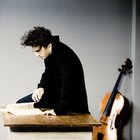Quatuor Ébène did not play their first notes in Bonn in a concert hall, but in the clatter and noise of Café Blau. The bar at our festival headquarters Viktoriabad offers anything but ideal conditions for a string quartet. There on the small stage, radio broadcaster WDR had erected its mics to record their show »Tonart« live on air. Quatuor Ébène embarked here on their residency at Beethovenfest 2022: An opportunity for the quartett to introduce themselves and the four concert projects they brought to Bonn – highlights of this year's festival that we relive here.


Quatuor Ébène played for the broadcast the first and second movement of Leoš Janáček's first string quartet, dubbed »Kreutzersonate«. For the live audience a magic moment: one seldomly hears the top quartet in such a dry, uncomplimentary acoustics. That was exactly why the French musicians dazzled with their skills and absolute passion. They played against the background noise as if their lives were at stake. In spite of the lacking resonance of the room they created a sound that could not be more vivid, colourful and shimmering, transforming the dull ambient noise.

A quartet in risk taking mode
Later that same day, we heard Janáček's first string quartet again at the Forum in Bundeskunsthalle. The beautiful acoustics there added some sound magic. But the phenomenon Ébène does not exhaust itself in their famous beauty of sound. Sound is no end in itself, no feel-good factor for the quartet. On the contraray, the four string players strive to the limits of their instruments. With the eighth string quartet of Dmitri Shostakovitch, they performed a work that demands harshness in sound. For the quartet it is important to create different expressions at every moment of the performance spontaneously. Cellist Raphaël Merlin explains how they manage to stay attuned and timed together in spite of this risk taking:
»Spontaneity is not very difficult to achive: it would be much more exhausting to fix everything and to try to deliver an exakt copy of an interpretation again and again.«

Quartet, quintet, sextet
The concert programmes can also not be called exact copies, which the quartet put together themselves for their residency. To have Beethovenfest grant them the freedom to choose settings and works appeared as a mark of confidence to the ensemble. Raphaël Merlin sums it up:
»The organisation and the audience simply trusted us. Because it is quite rare for us yet to be invited with not only one concert. We have been honoured here now, allowed to bring our own programmes. This recognition and trust means a lot to us.«
With their four concerts, Quatuor Ébène went far beyond the string quartet. Three of the four concerts included collaborations with other colleagues. Unfortunately, one of the programmes as a quintet with clarinet player Martin Fröst had to be changed into a quartet programme due to his illness.

On the stage of Kursaal Bad Honnef, the musicians performed together with their own students from music university Munich. They played string sextets by Peter Tchaikovsky and Richard Strauss. The quartet wishes to further their students, but they also are motivated by the learning process of teaching for themselves, as Merlin explains. Moreover, playing in a string sextet poses high mental challenges:
»You need a relatively fast thinking when playing chamber music without a conductor. You need to sustain enough attention and anticipation for the other voices, like an internal board computer. When you play with eight, or even six parts, the amount of information increases – it becomes more difficult for the brain. (…) Tschaikowsky for example is extremely dense, there is always more information everywhere, and you need to have quick reflexes and play ping pong.«
For Merlin, the sextet programme was his favourite concert at the residency. For many listeners, the final concert of the series must have been a secret highlight. The string quartet teamed up with cellist Nicolas Altstaedt for a string quintet at the Aula of Bonn University. During the hour in which Franz Schubert's string quintet unfolded in this space, time stood still. The endlessness of the lines that the musicians joined to a seamless singing reached everyone to the last rows of the hall. After the final tone, the audience stood up as one for standing ovations.

The first residency for Quatuor Ébène at a major institution
Quatuor Ébène is one of the leading string quartets of the world. The ensemble is decorated with prizes, performs internationally and is highly sought after. Their last big project, the complete recording of Beethoven's string quartets »Beethoven Around the World« in 2020, won international acclaim. Still, Beethovenfest 2022 was able to give a premiere to the quartet: It awarded it with its first residency at a festival or institution. Raphaël Merlin expresses the thankfulness for himself and his colleagues:
»We don't feel like the young generation anymore. We now achieved the status as, how to put it, an established ensemble. (…) It is a new feeling, not having to prove ourselves so much anymore, but rather maybe taking over civil responsibility. I appreciate it very much, that Bonn is the first place to gift us this.«
We may respond: The honour is ours!

The residency of Quatuor Ébène: all concerts
- , Bundeskunsthalle, Forum
Quatuor Ébène
Schostakowitsch, Janáček, Haydn
- , Stadttheater Rheinbach
Quatuor Ébène
Schumann, Mozart




